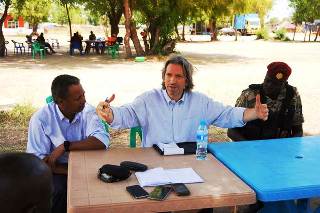Advocacy groups calls for leaders’ accountability in South Sudan
May 24, 2016 (WASHINGTON) – An advocacy group, Enough Project, said there was need in South Sudan to bring to justice the leaders responsible for the 2013 crisis.

The 9-page brief statement, entitled “The Paper Tiger in South Sudan: Threats without Consequences for Atrocities and Kleptocracy” was followed. The brief presents critical recommendations for U.S. leadership, including imposing and enforcing targeted sanctions on senior officials of consequence in order to pressure these leaders to place the well-being of their people ahead of personal enrichment and power politics.
“After 30 years of either living in, visiting, or working in South Sudan, and after extensive analysis undertaken by my colleagues at the Enough Project, our collective conclusion is that the primary root cause for the atrocities and instability that mark South Sudan’s short history is that the government there quickly morphed into a violent kleptocracy,” Deng said.
“Grand corruption and extreme violence are not aberrations; they are the system,” he said.
An elite pact, he added, like the current peace deal between the Juba government and the Sudan People’s Liberation Army-In Opposition (SPLA-IO) may be the quickest path out of the immediate violence.
He said unless the violent “kleptocratic” system is addressed head-on by policymakers internationally, the billions of dollars spent annually for peacekeeping, humanitarian aid, and the ongoing diplomacy and assistance supporting the peace deal there will simply be treating symptoms, not addressing the primary root cause of cyclical conflict.
“The surest way for the United States and the broader international community to create real consequences and build critically-needed leverage for peace is by hitting the leaders of rival kleptocratic factions in South Sudan where it hurts the most: their wallets,” the statement said.
The lack of money requires a hard-target transnational search for dirty money and corrupt deals made by government officials, rebel leaders, arms traffickers, complicit bankers, and mining and oil company representatives.”
“Addressing root causes will require much greater international leverage, which until now has been a cripplingly and puzzlingly insufficient part of international efforts to support peace and human rights in South Sudan.”
“Sanctions, anti-money laundering measures, prosecutions, asset seizure and forfeiture, and other economic tools of 21st-century foreign policy are key instruments in securing foreign policy goals,” it said.
The administration, it said, should consider enacting secondary sanctions that would target foreign financial institutions engaged in facilitation of public corruption in South Sudan.
Additionally, sectoral sanctions could be deployed to limit certain types of financing available for future (rather than current) petroleum projects.”
The representatives see some evidence that officials from countries neighbouring South Sudan may have played a role in facilitating or helping to conceal the offshoring of their assets.
“The United States has tools at its disposal to foster significant change and help to end the suffering on the ground in South Sudan,” it said.
He said the Obama administration should deploy the tools of financial pressure accordingly, and the U.S. Congress should work to ensure that the agencies responsible for administering sanctions and leveraging such tools have sufficient resources and staff to fulfil this mission.
(ST)
